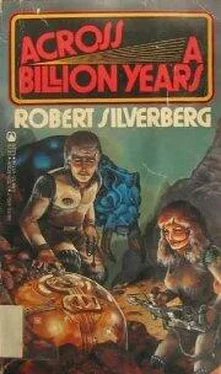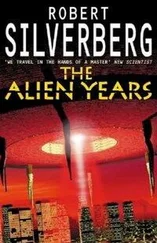It scares me a little to think that in a couple of centuries there may be intermarriage between androids and humans, with children produced. I wonder why that thought frightens me so much. Because an injection of android blood into our genetic pool may change us, maybe? Improve us? The thought hits me where my prejudices live.
But I won’t be there to see it happen. That’s comforting. Or is it?
* * *
On that ambiguous note I stopped dictating, ten days ago. It is now close to the end of November, and I pick up this cube again just to add the P.S. that we will be reaching GGC 1145591 in five more days. I doubt that anything significant will happen between now and then, and so I’m going to seal the cube.
Status remains quo in all ways. Whenever I see Jan, she’s with Saul and they’re deep in a discussion of the self-cancelling French stamps of 2115, or whatever. Kelly suggests I take up coin collecting in self defense. The idea doesn’t seem practical. What the zog, I suppose Saul is just the better man. I wish I knew why, though.
Away with such trivia. The dark star awaits us.
December 12, 2375
Planet III of GGC 1145591
We are very much on our own here. And things are extremely strange. I never imagined, when I picked a sedate profession like archaeology, that it would bring me to anything like this.
We are in a solar system that knows no daylight. We seem bewitched, transformed into gnomes, condemned to scuttle through dark tunnels lit only by a faint purplish glow breaking through from somewhere far above. But there are no tunnels. We are at the surface of the world. This is the condition of life here: unending darkness.
Even on Pluto the sun brings a sort of light, but not here. The sun of this solar system is a dead star, or rather one that is so close to death that we can sense the intensity of its final struggles. Our mood is subdued. We say little to one another. The petty conflicts that sometimes used to break out among us no longer break out. This place casts a mysterious spell. I feel as if I’m caught inside a cage of dreams.
The ultradrive crew that brought us here lost no time in clearing out. The cruiser landed on the third planet of the system, which has no name. (We are trying to think of one.) The crewmen unloaded our gear. Then they took off, fast.
Our rented planetship was waiting for us. It’s a little undersized, but it’ll do: carrying capacity of twenty-five, passengers and crew. For purposes of calculations the eleven of us count as twenty, thanks to Mirrik’s extra tonnage. The ship has a two-man crew. The captain is straight out of bad movies, a veteran-of-the-spaceways type with seamed space-tanned skin and faded blue eyes; he chews some mildly narcotic weed from a Deneb world and goes around spitting everywhere. The weed gives him the smell of a cloying perfume, which is a little at odds with his tough-guy image. His name is Nick Ludwig and he says he’s been piloting rental ships for thirty years. He’s ferried a lot of chartered cruises of millionaires around, but never archaeologists. The co-pilot is an android named Webber Fileclerk, with the usual glamor-plus appearance. An odd team.
The planetship is both our transport and our housing, for we have no facilities for blowing bubbleshacks. Whenever we go outside, we have to run through a complete airlock cycle, which is a sposhing pain, and we have to put on breathing-suits. There’s no atmosphere on this world. More accurately, there is one, but it’s frozen solid. The temperature here runs maybe five degrees above absolute, and everything freezes, hydrogen, oxygen, the whole periodic table. Our suits are insulated, of course, but it would be a quick death if a joint sprang.
Once upon a time this may have been a fairly decent Earthtype world. It’s a little more massive than Earth, and the gravity is maybe 1.25, which is to say enough to slow you down but not anything really uncomfortable. The atmosphere that lies around here in icy heaps was evidently our friendly oxygen-nitrogen mix. A terraforming crew could probably turn this place into a zingo resort planet simply by juicing up the thermonuclear reactions of the local sun until things thawed out.
The local sun…
We are obsessed by that sun. I dream about it, and I’m not the only one who does. When we leave the ship, we lose track of our purpose and stare at it for long minutes.
We wear telescopic glasses for a good view. There isn’t much to see with the naked eye. We’re only 110 million kilometers away from it, a lot closer than Earth is to its sun, but this star is small. And dark. Its visible disk is about one tenth that of the sun seen from Earth. We have to hunt around in the sky to find it, feebly flickering against the backdrop of space.
GGC 1145591 probably has a million years of life left in it, but as stars go it’s on its deathbed. A star takes a long time to die. As it burns up the hydrogen that is its fuel, it begins to contract, raising its density and turning the potential energy of gravitation into thermal energy. That’s what happened here, so many billions of years ago that it zaps the mind to think about it. Long before even the High Ones evolved, this star collapsed in on itself and became a white dwarf, with a density of tons per cubic inch. And burned on and on, gradually cooling, growing dark.
Now, as a black dwarf, it appears through the telescope like a vast lava field. There’s the gleam of molten metal, or so it seems, with islands of ash and slag drifting on it. The mean surface temperature of the star is about 980 degrees, so nobody’s likely to land on it even now. The ash masses radiate at about 300 degrees, and it’s much hotter inside, where the compressed nuclei still generate considerable kick. Even a dark star produces heat, but less and less of it all the time. A million years from now this black dwarf will be dead, just a big ball of ash drifting through space, cold, burned out. The last flicker of light will be gone from this solar system and the victory of night will be complete.
We do not plan to stay here any longer than we have to. As soon as we trace the asteroid on which the High Ones installed the rock vault, we’ll head for it.
This planet orbits the edge of the asteroid belt. There are thousands of asteroids beyond here, and may take weeks to find the right one. We begin with a very small scrap of information: the globe sequence showing a spaceship of the High Ones landing on a broad plain. From this it has been possible to calculate the curvature of the asteroid’s surface; given that, we can compute its approximate diameter. Luna City Observatory helped us with some of this. There’s a big margin for error, since we’re just guessing at the asteroid’s density, but at least we can eliminate 90 percent of the asteroids in the belt because they lie outside our parameters of size.
Now we’re making use of our planetship’s scanning facilities. Captain Ludwig has his equipment set up to track the whole asteroid belt; as each asteroid within the right size range comes within reach, he has the ship’s computer run an orbit for it. So far he’s found a dozen asteroids that seem to fit the specs. We’ll scan for another week; then we’ll begin to check the asteroids out, one by one. Let’s hope we don’t find too many more.
* * *
I think I’m starting to understand the troubles I’ve been having with Jan.
Every three hours somebody has to go outside the ship to set off a flare a thousand meters away. This has something to do with the measurements Nick Ludwig is making — something about triangulation — and I don’t pretend to understand it. We take turns doing it, and Dr. Schein insists that we do it in twos just to be safe. This morning, when flare time came around, Dr. Schein said, “Tom, you and Jan suit up and take the flare, yes?”
Читать дальше












